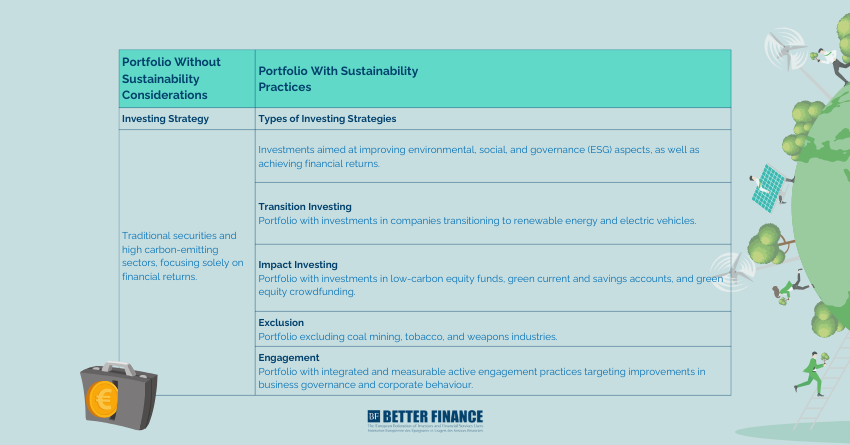
Climate change affects public finance systems around the globe and retail investors are increasingly concerned about making their investment work for both their financial future, and the well-being of the planet.
In BETTER FINANCE’s recent educational and advocacy campaign, 86% of retail investors across Europe aim to grow their capital in ways that combat climate change or benefit the environment.
As more retail investors take an interest in sustainable investing practices, the question lies in how this can be materialised. In reality, there are several strategies you can utilise. Read on to learn the four strategies through which you can make a difference with your investments!
Transition Investing
Transition investing involves allocating capital to improve economic activities that are currently not environmentally friendly.
This capital supports innovation and infrastructure development, helping these activities eventually achieve climate neutrality.
It includes investments in stocks, bonds, and other securities aimed at gradually reducing carbon footprints. For example, a fossil fuel company transitioning to a wind and solar power model.
Impact Investing
Impact investing refers to the practice of investing in companies or projects specifically to generate positive social or environmental outcomes, alongside financial returns.
Impact-oriented products can include green thematic equity funds, green equity crowdfunding, and other sustainable securities.
However, measuring the social and environmental impacts, such as a company’s impact versus the investor’s contribution to that impact, can be challenging.
Exclusion
Exclusion, or negative screening, avoids investing in companies or sectors that are harmful or do not meet specific ethical criteria.
The aim is to prevent negative impacts and align investments with ethical values. This can occur either before investing or during the investment lifecycle.
For example, if you do not wish to invest in the tobacco or weapons industries, you can exclude them from your portfolio.
Alternatively, if these sectors are part of your existing investments, you can divest and reinvest elsewhere.
Engagement
Engagement involves using shareholder influence to shape corporate behaviour.
This is a key tool for investors to align companies with net-zero goals, for instance.
Engagement can take the form of direct communication with senior management or company boards, filing or co-filing shareholder proposals, or proxy voting guided by ESG principles, all with the aim of driving corporate change.
Final Thoughts
Sustainable investing offers individuals the opportunity to align their financial goals with their commitment to a healthier planet. By adopting the strategies we discussed above, retail investors can play an active role in shaping a more sustainable future.
For more information on sustainable investment, check the green corner of our website.
*This article is created as part of BETTER FINANCE’s social media educational campaign to make finance more accessible to Europeans. Check the original post on our LinkedIn page.
To download the original post as PDF, click here.

